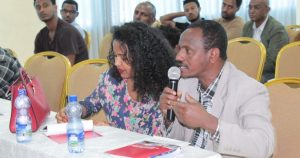Prior to CoST: Public infrastructure in context
Corruption has been identified as one the main issues affecting governance in Ethiopia. According to Transparency International’s Corruption Perceptions Index 2020, Ethiopia is ranked 94th globally with a score of 38, a five point improvement since 2012. Infrastructure in Ethiopia is particularly susceptible to corruption and mismanagement for a number of reasons, including its highly technical nature, the huge project costs involved and lengthy procurement cycles.

CoST Ethiopia: How it all began
Ethiopia was one of the eight countries chosen to be part of CoST’s three-year pilot programme, which focused on how a multi-stakeholder approach could increase transparency and accountability in delivering infrastructure projects. As a result of this, the then commissioner of the Federal Ethics and Anti-corruption Commission (FEACC) kick-started discussion in Ethiopia around full CoST membership and a committee was formed to undertake preparations. Upon its acceptance, the commissioner of FEACC was appointed as CoST Champion and FEACC the host organisation.
The four features of CoST
The CoST approach is focussed on four core features: disclosure, assurance, multi-stakeholder working and social accountability. These features provide a global standard for CoST implementation in enhancing infrastructure transparency and accountability.
Disclosure in Ethiopia
The disclosure process ensures that information about the purpose, scope, costs and execution of infrastructure projects is open and accessible to the public, and that it is disclosed in a timely manner.
Disclosure is progressing in Ethiopia with two procuring entities disclosing information on 17 projects, with further commitments to scale up their disclosure. This is significant given the changes in the political economy currently underway in the country. The procuring entities are Addis Ababa Water and Sewerage Authority (AAWSA) and Addis Ababa City Roads Authority (AACRA). This data is currently published on CoST Ethiopia’s website and will be published on the AAWSA and AACRA websites when they are next upgraded. Despite the fact that the internet in Ethiopia was shut down for weeks at a time in the first six months of 2019, there was nevertheless an average of 887 unique monthly visitors to the CoST disclosure portal during this time.
The total number of projects disclosed in Ethiopia currently stands at 106.
Cross-government commitment to disclosure
In 2016, CoST Ethiopia signed a quadripartite Memorandum of Understanding on sustainable disclosure in line with the CoST Infrastructure Data Standard (CoST IDS). This was signed with FEACC, the Office of the Federal Auditor General (OFAG) and the Federal Public Procurement and Property Administration Agency (FPPA). The memorandum formalises these procuring entities’ commitment to disclosing data and specifies the projects which will be included. As a result of this, CoST Ethiopia has trained 42 procuring entities and helped adapt the FPPA’s website to disclose project information.
Ultimately, this commitment aims to introduce proactive disclosure in all federal procuring entities.
Training
CoST Ethiopia trains officials from procuring entities on the CoST approach and the disclosure process, often enlisting professionals from stakeholder institutions to lead these sessions. In addition, representatives from CoST Ethiopia attend external events, panels and training sessions in order to communicate the CoST approach: to date, over 870 representatives from the media, government and other stakeholders in Ethiopia have received CoST training as a result.
Online portals
Regular, proactive disclosure has not yet started in Ethiopia. However, the Public Procurement and Property Administration Agency’s portal holds data from 41 contracts from 16 procuring entities. CoST Ethiopia’s portal holds data from 17 projects which have been proactively disclosed.
Legal mandate for disclosure
Institutionalising the CoST approach via legal mandates will help ensure the long-term sustainability of transparency actions. CoST Ethiopia is working with appropriate government institutions to ensure this is achieved.
Ethiopia’s Procurement and Property Administration Proclamation (No.649/2009) has laid the groundwork for a legal mandate on disclosure in Ethiopia. While the proclamation signifies good progress towards institutionalising CoST disclosure requirements in Ethiopian law, it falls short of regulating full proactive disclosure. It is currently under revision and CoST Ethiopia is working towards including articles which address all aspects of disclosure, such as more a rigorous assessment of the pre and post-contract award stage.
Assurance
We promote accountability through the CoST assurance process – an independent review of the disclosed data by assurance teams based within CoST national programmes. The teams identify key issues of concern in relation to the items listed in the CoST IDS and put technical jargon into plain language. This allows social accountability stakeholders to easily understand the issues and hold decision-makers to account.
Between 2010 and 2016, CoST Ethiopia’a assurance process reviewed 52 building, road and water infrastructure projects representing US$3.27 billion of investment. In 2016, an Aggregation Study was published by CoST Ethiopia to review and synthesise the project information disclosed, and provide a comprehensive overview of the state of Ethiopian infrastructure.
CoST Ethiopia has undertaken three assurance processes. A full mix of stakeholders from government, the private sector, and media and civil society attended CoST Ethiopia’s most recent report launch in November 2018. The third assurance report, which assessed 14 building projects with a collective value of US$ 78.2 million, found procuring entities disclosed an average of 68% of the CoST IDS. In Ethiopia the CoST IDS has been adapted to the Ethiopian context so that 70 data points (or items) are used to assess infrastructure transparency across key stages of the project cycle.
The last assurance process highlighted that progress still needs to be made to enable a culture of disclosure in Ethiopia. There are also issues relating to time and cost overruns, poor preparation for projects, noncompliance with procurement regulations and capacity limitations within the sector. A key recommendation was to amend procurement regulations in such a way as they cover the full spectrum of procurement, enhancing the capacity of enforcing bodies and introducing transparency. Crucially, these all require buy-in from political leadership.
The 14 project reports which were produced during CoST Ethiopia’s third assurance process are available here. Various reports for CoST Ethiopia’s previous assurance processes can be found here.
Multi-stakeholder working in Ethiopia
CoST brings together stakeholder groups with different perspectives and backgrounds from across government, private sector and civil society. Through each national programme’s Multi-Stakeholder Group, these entities can guide the delivery of CoST and pursue infrastructure transparency and accountability within a neutral forum.
CoST Ethiopia’s MSG currently has nine members from civil society, government and private sector. The current Champion of CoST Ethiopia is H.E. Ayelign Mulualem, Commissioner of FEACC.
Social accountability
CoST works with social accountability stakeholders such as the media and civil society to promote the findings from its assurance process so that they can then put key issues into the public domain. In this way, civil society, the media and citizens can all be aware of issues and hold decision-makers to account.
Engaging with media outlets is a key means by which to enhance social accountability and ensure that decision makers remain responsive to issues in public infrastructure. CoST Ethiopia has established a media forum through which to engage media outlets, which has resulted in two training sessions for the media and serves as a means to communicate all CoST activities. At the launch of CoST Ethiopia’s third assurance report in November 2018, CoST Ethiopia convened national media outlets to focus on the report’s key messages and disseminate findings to the public. The report was reported on in 14 separate mainstream outlets including a radio talk-show.